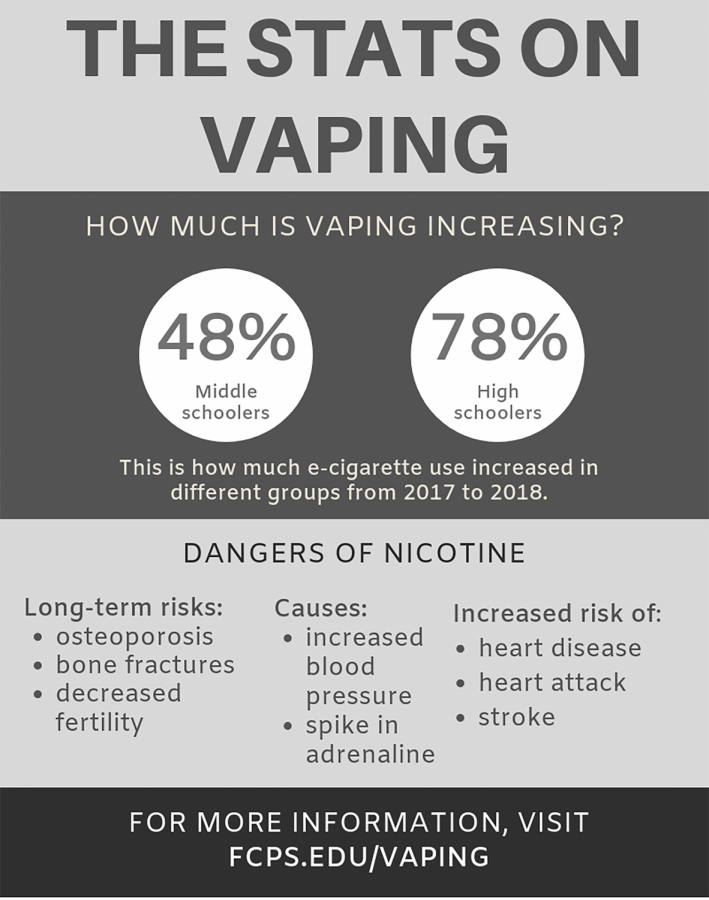The vaping epidemic must be stopped
October 2, 2019
Students currently in middle and high school have grown up surrounded by anti-smoking rhetoric. We were told to “Just Say No” to drugs and taught about the consequences of tobacco use in health class. We were supposed to be the generation that ended smoking, and the future was looking bright- until recent years, when vaping began to dominate the scene.
Also known as vape pens and e-hookahs, vapes are a kind of electronic cigarette that has widely replaced the regular cigarette. The popular company JUUL sells JUULpods, often called ‘juuls’ or simply ‘pods.’ Unlike the traditional cigarette pack, a pod is reusable and compact. It resembles a flash drive and can even be plugged into a computer to recharge, which allows teenagers to easily hide them from parents and teachers. In addition to the appearance of these vapes, the taste serves as another feature that attracts users.
“The reason most kids start is because of flavors,” senior Kamal Mazhar, who is a co-founder of Teens Against Vaping, a federally registered nonprofit that aims to end teenage vaping, said. “Unlike cigarettes, juuls have fruity flavors, which are appealing to teens.”
However, many youths who partake in e-cigarette use may not be aware of the consequences. One of the reasons for this lack of awareness is the newness of vaping’s popularity, meaning that not enough time has passed for studies to be conducted on its long-term impacts.
“We [Teens Against Vaping] were contacted by the FDA [Food and Drug Administration], and one of their congressional correspondents gave explanations as to why some of their research was delayed,” Mazhar said. “Because this is a new issue, a lot of stuff they had is outdated.”
In some of the data that has been collected, Johns Hopkins Medicine reports that though cigarettes are worse for a person’s health than juuls, vaping still threatens adverse consequences. The American Cancer Society is tracking research on vaping, and several cases have required hospitalization of users. Nicotine, the primary agent in juuls, is a toxic chemical that increases blood pressure and causes an adrenaline rush, two factors known to raise the risk of having a heart attack. The nicotine in juuls also has an impact on the user’s respiratory system.
“It can cause popcorn lung, where if you were to listen to the lungs through a stethoscope, you would hear crackling noises. It’s irreversible lung damage,” health teacher Carmen Wise said. “Right now we’re seeing the short-term side effects, and they’re pretty consistent with the other ways of accessing nicotine. It’s very similar to cigarettes.”
Not only is nicotine harmful, it’s also highly addictive. According to Hopkins, e-cigarette users consume even more of it than traditional cigarette users because of options like extra-strength cartridges and increased voltage. Along with the impact vaping has on the body, students who are caught vaping also have to pay the price of school and legal consequences.
“It’s possession of nicotine, so it’s the same as having cigarettes,” School Resource Officer Aaron Jefferson said.
According to Jefferson, under new Virginia legislation, for people under 21, both smoking and vaping are civil penalties.
Vaping is spreading rapidly through the current generation of teenagers, and for young people aspiring to better futures, the looming epidemic threatens to dismantle all they’re striving to achieve.
“They’re now starting to see deaths related to vaping. Kids work too hard to get things in life, and now here they are setting themselves back because they put this stuff into their body that’s harmful for them,” Jefferson said. “I don’t understand why kids would do that.”


